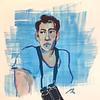Take a photo of a barcode or cover
Trois courts récits passionnants, trois quêtes qui convergent. Des personnages en déséquilibres émotionnels qui tentent dans des choix hors du commun de retrouver la quiétude. Touchant
slow-paced
This was enjoyable because of the thematic tie into my trip, but I really wasn’t enthralled by the plot very much. It was rather long-winded and not incredibly interesting. I did think that the parallel between Agatha Christie and Jesus was a mind teaser
"I understand it in the main, but it comes through a fog."
Absolutely fantastic!
Absolutely fantastic!
More reviews available at my blog, Beauty and the Bookworm.
So, I think Yann Martel is best known for the other book toted on the cover of this one: Life of Pi. I read Life of Pi a while back, and while I liked the story, I didn't like the religion floating about in the background. For a while, I thought that was going to be the case with The High Mountains of Portugal, too. Once I realized that the title was actually Portugal, and not Peru. For some reason I kept reading this as Peru. I am well aware that Portugal and Peru are not the same country, but the "mountains" snapped in my mind as Peru, because I didn't think Portugal had mountains. And guess what? It doesn't. But when I opened the book and it started in Lisbon, I was very confused, because I didn't know why we were in Portugal when I thought we were supposed to be in Peru. Oooooops. My bad.
That said, I think about exactly half of this book is good.
The book is divided into three parts taking place in different time periods, but which are all linked together by a town in the High Mountains of Portugal. The first part follows a young man who has recently lost his lover and their son. Left with nothing but his career at a museum, he sets out for the High Mountains (which are really more of a desert-like plateau) to recover a unique crucifix he's read about in the diaries of a priest (also the crucifix's creator) who spent time in Angola and Sao Tome tending to the spiritual needs of slaves. Unfortunately, this part of the book focuses mainly around driving. At first, Tomas' attempts to work his uncle's brand-new automobile, complete with elephant ear mudflaps, are amusing. But when he's still driving pages upon pages upon pages later, with not much changing at all... It was interminably boring, and while the discovery at the end of this first part was mildly interesting, it didn't justify the monotonous agony that went before it.
The second part was half-and-half. It starts out with a long, long treatise from the main character (of this part's) wife about finding God in Agatha Christie novels. Quite frankly, I don't care. The second half, dealing with the autopsy of a man who is carried into the main character's pathology department in a suitcase, took a turn for the surreal, and suddenly there's a question of reliability. Is the main character, whose name I can't remember, a reliable narrator or not? There's definitely a weird element to this, and a ghostly one, and those parts were much more interesting.
Finally, the third part of the book deals with a Canadian senator who adopts a chimpanzee while on a trip to the US, and moves to Portugal. I liked this part of the book, but probably more because it was a "new pet" story than anything else. And I liked the end here, with the revelation of something that everyone had thought was gone.
Like Life of Pi, there's this religious aspect running all throughout the book. Not being religious, I didn't get this and I consequently didn't like it. I thought there were some good atmospheric and story elements here, and that the second half was better than the first, but overall not a book I would recommend. The seemingly endless start combined with the rambling about religion in Agatha Christie in the second part were just roadblocks that I don't think the better elements ever really managed to recover from.
2 stars out of 5.
So, I think Yann Martel is best known for the other book toted on the cover of this one: Life of Pi. I read Life of Pi a while back, and while I liked the story, I didn't like the religion floating about in the background. For a while, I thought that was going to be the case with The High Mountains of Portugal, too. Once I realized that the title was actually Portugal, and not Peru. For some reason I kept reading this as Peru. I am well aware that Portugal and Peru are not the same country, but the "mountains" snapped in my mind as Peru, because I didn't think Portugal had mountains. And guess what? It doesn't. But when I opened the book and it started in Lisbon, I was very confused, because I didn't know why we were in Portugal when I thought we were supposed to be in Peru. Oooooops. My bad.
That said, I think about exactly half of this book is good.
The book is divided into three parts taking place in different time periods, but which are all linked together by a town in the High Mountains of Portugal. The first part follows a young man who has recently lost his lover and their son. Left with nothing but his career at a museum, he sets out for the High Mountains (which are really more of a desert-like plateau) to recover a unique crucifix he's read about in the diaries of a priest (also the crucifix's creator) who spent time in Angola and Sao Tome tending to the spiritual needs of slaves. Unfortunately, this part of the book focuses mainly around driving. At first, Tomas' attempts to work his uncle's brand-new automobile, complete with elephant ear mudflaps, are amusing. But when he's still driving pages upon pages upon pages later, with not much changing at all... It was interminably boring, and while the discovery at the end of this first part was mildly interesting, it didn't justify the monotonous agony that went before it.
The second part was half-and-half. It starts out with a long, long treatise from the main character (of this part's) wife about finding God in Agatha Christie novels. Quite frankly, I don't care. The second half, dealing with the autopsy of a man who is carried into the main character's pathology department in a suitcase, took a turn for the surreal, and suddenly there's a question of reliability. Is the main character, whose name I can't remember, a reliable narrator or not? There's definitely a weird element to this, and a ghostly one, and those parts were much more interesting.
Finally, the third part of the book deals with a Canadian senator who adopts a chimpanzee while on a trip to the US, and moves to Portugal. I liked this part of the book, but probably more because it was a "new pet" story than anything else. And I liked the end here, with the revelation of something that everyone had thought was gone.
Like Life of Pi, there's this religious aspect running all throughout the book. Not being religious, I didn't get this and I consequently didn't like it. I thought there were some good atmospheric and story elements here, and that the second half was better than the first, but overall not a book I would recommend. The seemingly endless start combined with the rambling about religion in Agatha Christie in the second part were just roadblocks that I don't think the better elements ever really managed to recover from.
2 stars out of 5.
This author.
This book...
"Every corpse he opens up whispers to him 'I am a guinea pig, will you warm me to your breast?' "
This book is pretty crazysauce. So meandering and focused on detail at the expense of story. So much detail about that car. Too much talk about body parts and autopsies and monkeys scare me anyway, this book is like a fever dream.
And I don't feel like I learned anything about Portugal or Portuguese culture.
I don't think I want to read any more of Yann Martel's writing.
This book...
"Every corpse he opens up whispers to him 'I am a guinea pig, will you warm me to your breast?' "
This book is pretty crazysauce. So meandering and focused on detail at the expense of story. So much detail about that car. Too much talk about body parts and autopsies and monkeys scare me anyway, this book is like a fever dream.
And I don't feel like I learned anything about Portugal or Portuguese culture.
I don't think I want to read any more of Yann Martel's writing.
I probably would not have picked this book up if I had remembered sooner that Yann Martel was the author of Life of Pi, which I found incredibly boring. This book too was a disappointment. I enjoyed the middle section well enough on its own but felt that the book as a whole did not stand up. I find Yann Martel's writing to be ... lacking.
mysterious
reflective
slow-paced
Plot or Character Driven:
A mix
Strong character development:
Yes
Loveable characters:
Complicated
Diverse cast of characters:
Yes
Flaws of characters a main focus:
Complicated
Not sure I can rate this. Interesting story and beautifully written but bizarre and at times difficult to follow. Took me a long time to get through.
DNF after 50%, I just can’t sit through it anymore.
This book was just bad. I found the story telling to drag on and on, riddled with insignificant details that were overly descriptive and meaningless to the story. So much wasted potential on more interesting points. I read part one, which is 50% a description of how automobiles look and function in the early 1900s, 20% about this man’s body lice, and 30% the actual story. I barely got halfway through the second part, which is a completely different story, only vaguely related to the first. Reading this was not fun, and I didn’t want to waste any more time. Really disappointed because Life of Pi was so good.
This book was just bad. I found the story telling to drag on and on, riddled with insignificant details that were overly descriptive and meaningless to the story. So much wasted potential on more interesting points. I read part one, which is 50% a description of how automobiles look and function in the early 1900s, 20% about this man’s body lice, and 30% the actual story. I barely got halfway through the second part, which is a completely different story, only vaguely related to the first. Reading this was not fun, and I didn’t want to waste any more time. Really disappointed because Life of Pi was so good.
This put the "trip" in "triptych."
And I'm unsure how to feel about it.
And I'm unsure how to feel about it.
This book is weird. I liked the first story with the challenges with the car. The second story is super weird. The third story is boring. Weird, weird book.





